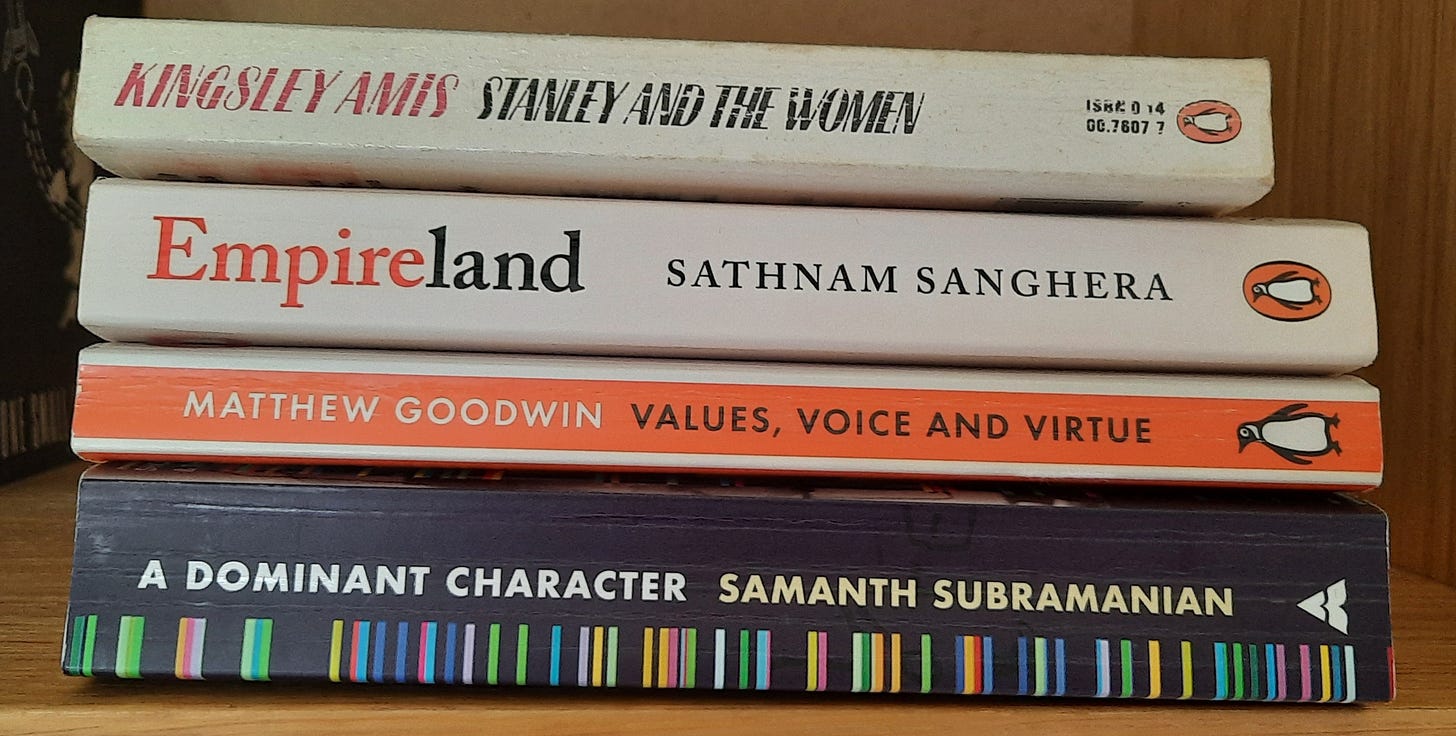What I read in April
Kingsley Amis’s Stanley and the Women tells the story of a middle-aged journalist whose pleasant life is disturbed by his son, Steve, developing schizophrenia. Stanley tries to get help for Steve while his wife, ex-wife, mother-in-law, mistress, doctors and colleagues throw obstacles in his way. As the title suggests, it’s the women in Stanley’s life - all seemingly just as crazy as his son - who cause him the most problems.
I’ve long been a fan of Kingsley Amis. Lucky Jim is one of my favourite books and I loved Take A Girl Like You. But I did not enjoy Stanley and the Women quite so much. Published in 1981, this is one of Amis’s later works and yet it seems more dated than novels he published several decades earlier. It’s a reminder of how rapidly life has changed. Characters drink throughout the working day before jumping in a car and driving home, cigarette in hand, to drink some more. Work starts late, is interrupted by long alcohol-fuelled lunches, and finishes early. Doctors make home visits and discuss their patients’ prognosis over a large whisky. This is a world without health and safety announcements or political correctness. It’s good fun, at first, despite Steve’s dire situation being made worse by everyone he encounters being either lazy, stupid, self-obsessed or incompetent. Reading Stanley and the Women has not turned me into a misogynist but after 300 pages the message that all women are crazy became a little tedious.
I read Sathnam Sanghera’s Empireland hoping it would provide a counterpoint to Nigel Biggar’s Colonialism. Sadly, it didn’t. I struggled to understand exactly what Sanghera was trying to achieve. Despite the title, the focus of the book is not really empire but Britain today. Sanghera shows how every aspect of our lives - from the food we eat to the words we use, from the artefacts we house in museums to the names we give our streets - has been shaped by empire.
Few would question this account. But what to make of it? This widespread acceptance of all things once-thought ‘foreign’ could be used to show that Britain has acted as a cultural melting pot and people are generally open-minded and tolerant. But no. Sanghera’s concern is that we have appropriated all manner of objects and practices from the former colonies without giving them due acknowledgement and this, he argues, is down to our failure to teach history properly.
Sanghera’s evidence for biased history teaching is largely anecdotal. His own education did not cover the legacy of empire, and therefore all schooling must be decolonised. At this point, the aim of his book becomes clear. It is part history, part sociology but mainly autobiography. It is Sanghera’s preoccupations that drive the book forward and his main preoccupation is Brexit. His hypothesis is that nostalgia for empire drove the vote to leave the EU and it was the curry-eating, statue-loving plebs who go to Spain for a holiday but insist on ordering a full-English breakfast while there, who backed Brexit. Sanghera writes convincingly about his experiences of racism, but then thinks nothing of expressing contempt for leave-voters. He loathes the prejudices of the elite Victorian colonialists but perfectly encapsulates the prejudices today’s new elite happily express towards Britain’s white working class.
Sanghera, with his private schooling (albeit on an assisted-place scholarship), Oxford-degree, weekly Times column and full-set of woke values is a textbook member of what Matthew Goodwin describes as Britain’s new elite. In Values, Voice and Virtue, Goodwin provides a wealth of statistics to show the political cleavage between working class voters and the elite graduate-class that runs society. This excellent book is vital reading for anyone serious about understanding today’s political landscape.
Another great read is A Dominant Character by Samanth Subramanian. This biography of J.B.S. Haldane brings to life an incredible man whose scientific work continues to influence the study of genetics. It’s an inspiring account of how people can live and what they can achieve when not held back by limits and fear.




